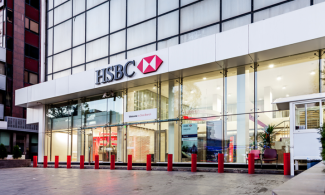
The Presidency asked the bank to return stolen assets allegedly stashed away in their vaults. HSBC and UBS might have revised their predictions, seen the possibility of a Buhari win in 2019 and so decided to sever business ties with Nigeria before what they see as an economic calamity is foisted on the nation.

On Friday, the Central Bank Of Nigeria (CBN) announced in a report that global banking giants HSBC, a British multinational banking and financial services holding company, and UBS, a Swiss multinational investment bank and financial services company, have closed their representative offices in Nigeria.
While the report from the apex bank did not give reasons for the decision of the two global banks to close their offices in Nigeria, the development has generated reactions from Nigerians across various strata. Some believe it is good riddance to bad rubbish since the banks, especially UBS, have been a conduit for siphoning our common wealth by most of our corrupt politicians into foreign financial vaults and these foreign countries use the money to run their economies.
There is another group, which is of the opinion that the banks' decision to close shop in Nigeria was informed by our bad economic situation and this might send unpleasant signals to the international community and spell economic doom for the country.
POSSIBLE REASONS FOR THE EXIT
HSBC Accused Buhari Of Presiding Over A Strugglling Economy
The two foreign banks, HSBC in particular, have not been in good terms with the Nigerian government recently. Sometime in July, HSBC made a sort of political prognostication that a second term for the sitting President, Muhammadu Buhari, risked prolonging the economic quagmire of the country. It even said the President’s approval ratings sat near all-time lows. In a report by HSBC on Nigerian economy titled, ‘ Nigeria: Papering Over The Cracks’, the global bank graphically painted the picture of a struggling and basket case economy of Nigeria whose consequence is a record-high unemployment and which in turn has given rise to an alarming number, 87 million, of poverty-stricken Nigerians.
The government dismissed the report and labelled HSBC as one of the killers of Nigeria’s economy that aided the unbridled looting of Nigerian resources by corrupt leaders. The Presidency asked the bank to return stolen assets allegedly stashed away in their vaults. HSBC and UBS might have revised their predictions, seen the possibility of a Buhari win in 2019 and so decided to sever business ties with Nigeria before what they see as an economic calamity is foisted on the nation.
The CBN And MTN Case
Investor confidence in Nigeria has been ebbing since the central bank, in August, ordered MTN to bring back $8.1 billion, part of profits which the South African telecoms firm sent abroad, to the country. Other firms too might be afraid of having the same fate befalling them.
Fall Of Foreign Direct Investment
The fact that the Foreign Direct Investment (FDI) of Nigeria, as announced by the CBN, fell to N 379.84bn in the first half of the year from 532.63bn a year earlier might be a cause for concern for foreign investors and hence the decision of HSBC and UBS to close their branches in Nigeria; and when this is coupled with the fact that the economic outlook of the country has every tendency to be dwarfed by the 2019 election, then the decision of foreign investors to close shops until the coast is clear might be wise and understandable.
The Introduction Of BVN
Despite the unpleasant status of the Nigerian state in the international community, it seems the country redeemed itself a bit with the introduction of Bank Verification Number (BVN). The introduction of BVN has made it easier for the financial regulatory bodies to monitor outflow and inflow on every account. Perhaps this has been a great obstacle to the smooth running of the operations of the global banks, which one of their major purposes is to help customers who can afford their services, an easy way to transfer funds overseas.
The Possible Implications For The Economy
HSBC and UBS were not set up for regular banking. While their operations lasted in Nigeria, they never ran salary accounts, neither were they set up to give loans to customers. However, the exit of two of the bulge-bracket firms, as they are called in investment banking, from the country will negatively affect the confidence of foreign investors to come to Nigeria. This is because when foreign financial institutions are operating in a country, it becomes easier for investors from their local environments to navigate and invest their resources in such a country.
Also, this will negatively affect this administration’s rating in the ease-of-doing business rankings.